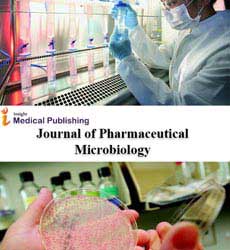Antimicrobial Investigation and Structure Activity Analysis of Natural Eugenol Derivatives against Several Oral Bacteria
Michael Kale N Lopez, Marco Hadisurya and Richard G Cornwall
Published Date: 2019-07-26Michael Kale N Lopez, Marco Hadisurya and Richard G Cornwall
Background: Essential oils isolated from plants are rich with phenolic compounds which have exhibited promising antimicrobial activity against various oral bacteria. Objective: Herein, the antimicrobial activity of methyl eugenol, eugenol and hydroxychavicol were analyzed against several oral bacteria. A correlation between molecular structure variation and antimicrobial activity was also investigated. Materials and Methods: Minimum inhibitory concentrations were determined using a serial microdilution method in a 96-well plate and by colorimetric analysis with resazurin dye. Aliquots from each well within the MIC range were placed onto suitable agar plates and the minimum bactericidal concentration was determined as the lowest concentration with no observed colony growth. Methyl eugenol, eugenol, and hydroxychavicol were tested against a total of ten oral bacteria. Results: Hydroxychavicol exhibited the lowest inhibitory and bactericidal concentrations against all bacteria tested with MIC values as low as 25-50 µg/mL and MBC values as low as 37.5-50 µg/mL. A structure-activity analysis indicates that free hydroxyl groups attached to the benzene ring of the molecular structure increase the antibacterial effectiveness of these compounds. Conclusions: This study provides insight into the mechanism of antibacterial activity of phenolic extracts against oral bacteria and can be used for the synthesis of more potent analogs for oral health treatment.
Open Access Journals
- Aquaculture & Veterinary Science
- Chemistry & Chemical Sciences
- Clinical Sciences
- Engineering
- General Science
- Genetics & Molecular Biology
- Health Care & Nursing
- Immunology & Microbiology
- Materials Science
- Mathematics & Physics
- Medical Sciences
- Neurology & Psychiatry
- Oncology & Cancer Science
- Pharmaceutical Sciences
